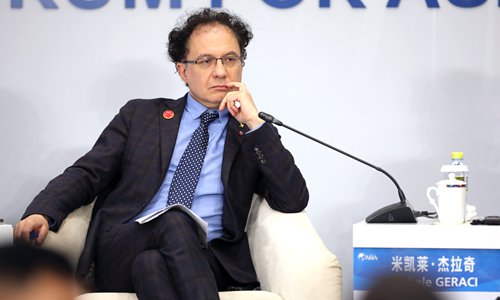Politicians’ China compensation claims a result of Italy’s domestic political instability and geopolitical mindset: prominent Italian economist

Economist Michele Geraci, former undersecretary of state at the Italian Ministry of Economic Development (photo: IC)
Economist Michele Geraci, former undersecretary of state at the Italian Ministry of Economic Development, said some Italian politicians asking for compensation from China for the novel coronavirus (COVID-19) "should not be interpreted as something against China per say."
Geraci said he doesn't favor this compensation claim and the general Italian public won't be affected either, adding "the people and companies in Italy are actually willing to do business with their Chinese counterparts."
A key figure in Italy's Northern League party recently clamored for billions in compensation from Chinese authorities after similar attempts had been made by a few Italian non-profit organizations.
Paolo Grimoldi, party deputy and secretary of its Lombardy branch, said he was ready to send a 20 billion euro ($21.67 billion) demand to the Chinese ambassador to Italy.
His claim was later echoed by President of Lombardy Attilio Fontana, who said the Regional Council of Lombardy would discuss the issue, reported Milano Today on May 3.
Fontana once spoke highly of China's experience fighting COVID-19 at a local press conference in late March, where a Chinese medical team in Italy also made a presentation. His supportive attitude toward the compensation claim has sparked anger on Chinese social media, with many netizens criticizing him as ungrateful.
The claim, though meant for China, is in reality more an Italian domestic political issue rather than an international matter, Geraci told the Global Times on Thursday.
Italy's political landscape is very unstable with frequent changes of government, Geraci said. With high political instability, the demand for compensation should therefore be read as an attempt by local Lombardy politicians to gain consensus amongst the public instead of something against China, he added.
"Similarly, President Trump's statements against China on trade issues and on the virus can also to be interpreted as him talking to his domestic electoral basis of the Midwest as the November elections approach," said Geraci.
The compensation claim is also the result of a few politicians' focus on the US as the pandemic is often unnecessarily raised to a geopolitical level, Geraci said.
"Probably there is a desire [from] some Italian politicians to reaffirm their friendship with the US, and this action is intended to be in that direction," Geraci said. He added that he thinks that motive is unnecessary as Italy has a good relationship with the US, "just like we have very good relationship with all countries in the world including China."
The compensation claim is also a response to the local mood amid the pandemic, Geraci said.
Lombardy was the region hardest hit by COVID-19 in Italy, with many deaths and family members lost, he said. "So there has been a bit of an emotional reaction to this and, as usual, people look for comfort in some legal actions," he added.
Taking the above reasons into account, Geraci predicts Grimoldi's proposal - which he said is going to be presented at the Regional Assembly of Lombardy for a vote - will be approved.
Lombardy is not the only region where politicians are attempting to ask China for compensation. In Veneto, representatives of Forza Italia were reported to have made a request to the region's governor, Luca Zaia.
Geraci said he personally doesn't favor proposals like Grimoldi's. "People usually find external variables to blame when they get upset or suffer," he told the Global Times. "However, Italy should do more introspective analysis of the government and society under the pandemic."
As for the general Italian public, Geraci said they won't be affected by the China compensation demands.
"No matter what they have heard from politicians, the people and companies in Italy are actually willing to do business with their Chinese counterparts as much as before," he told the Global Times.
